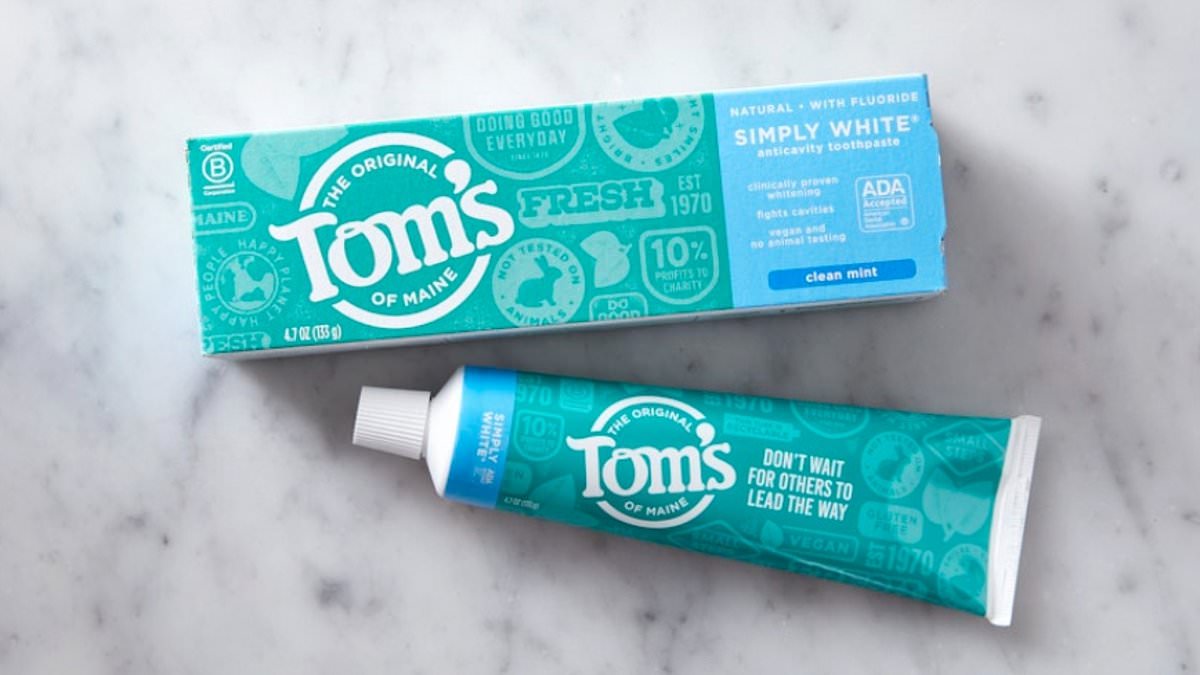A popular toothpaste product from the all-natural hygiene company Tom’s of Maine was found to be made with water containing dangerous bacteria.
Toothpaste from Tom’s of Maine, which is owned by Colgate-Palmolive, was manufactured with water found to contain three different potentially dangerous bacteria, while a mold-like substance was found at the manufacturing facility.
A warning letter from the FDA stated Tom’s Simply White Clean Mint toothpaste, which sells for $6, contained Pseudomonas aeruginosa and a ‘black mold-like substance’ at the company’s Sanford, Maine manufacturing facility, primarily around water tanks and manufacturing equipment.
FDA investigators also found Ralstonia insidiosa, another type of bacteria, in water sources at the factory in Sanford, Maine.
A second Tom’s product, the Wicked Cool! Anticavity Toothpaste, was found to contain the deadly bacteria Paracoccus yeei.
P. aeruginosa has been known to cause blood and lung infections, while R. insidiosa infection is often linked to hospital settings and can lead to infections in the bloodstream, lungs, wounds or surgical sites, and the urinary tract. And P. yeei has been known to cause peritonitis and conjunctivitis.
The FDA’s inspection of the facility was performed in May.
The agency said in its letter to Tom’s: ‘Water is a major ingredient in many of your OTC drug products. It is essential that you employ a water system that is robustly designed, and that you effectively control, maintain, and monitor the system to ensure it consistently produces water suitable for pharmaceutical use.’
Tom’s of Maine makes a wide range of personal care products, from shampoo and toothpaste to deodorant. The company states on its website that it prides itself on using ‘safe’ and ‘hardworking’ ingredients.
It touts several products’ natural ingredients that are safe and free of chemicals.

FDA inspectors visited the Tom’s of Maine Sanford facility and found inadequate water system controls, failure to maintain proper sanitary conditions, and poor handling of product complaints. The facility was found to have mold-like substances in areas close to equipment for production
The company, for its part, said: ‘We have always tested finished goods before they leave our control, and we remain fully confident in the safety and quality of the toothpaste we make.
‘In addition, we have engaged water specialists to evaluate our systems at Sanford, have implemented additional safeguards to ensure compliance with FDA standards, and our water testing shows no issues.’
Despite FDA inspectors’ findings, there has been no product recall. The FDA has also asked Tom’s owner, Colgate-Palmolive, to supply additional documents regarding manufacturing operations with a ‘thorough review of all microbiological hazards’ and submit results of that testing.
The FDA is required to inspect manufacturing facilities of over-the-counter cosmetics and drugs to make sure they are following Current Good Manufacturing Practices.
There is no indication that the FDA initiated the inspected for any reason other than it is a routine requirement.
The products are still presumed safe by the FDA, which has not issued a recall for any of them.
The FDA specifically found the facility violated Current Good Manufacturing Practices by failing to prevent potentially dangerous microorganisms in water samples used in product manufacturing and equipment cleaning.
The agency inspectors also found the water system used in manufacturing and cleaning failed to meet anti-microbial specifications.
The facility was shown to have a black mold-like substance and powder residues in areas where the products were made. It is possible that mold spores, which travel through the air, could have landed on moist equipment.
And customer complaints about the odor, color, or taste of the products were not investigated.

Tom’s of Maine’s Sanford facility is still open, but the company will have to submit a corrective action plan to the FDA. There is no indication that anyone has gotten sick
The facility has not been closed. Instead, the agency requires the company to submit a detailed corrective action plan, including a review of health safety hazards and possible necessary product recalls.
There is no indication anyone has gotten sick due to any of these pathogens, but if they were to infect someone, the consequences could be severe.
Pseudomonas aeruginosa, a major cause of infections acquired in hospitals, can be severe depending on how it enters the body.
On the mild end, it could lead to conditions like swimmer’s ear (otitis externa), particularly if the bacteria enter the ear from contaminated toothpaste or hands. This is typically a treatable infection, causing symptoms like ear pain and discomfort.
On the more severe end, particularly in individuals with weakened immune systems, Pseudomonas can lead to serious infections such as pneumonia, bloodstream infections (sepsis), or bone infections (osteomyelitis). These infections can spread rapidly and may cause systemic symptoms like fever, chills, confusion, and shock.
In general, while healthy individuals are less likely to experience severe infections, those with compromised immune systems or open wounds are more vulnerable to the harmful effects of disease.
Ralstonia insidiosa is generally dangerous for people with weak immune systems and is typically acquired in hospital settings. It can lead to infections in the bloodstream, lungs, wounds or surgical sites, and the urinary tract.
It’s usually resistant to antibiotics, making the infection hard to treat.
And Paracoccus yeei also causes rare infections in people with compromised immune systems and has been linked to a variety of infections, including at wound sites, the bloodstream, and the respiratory system, often requiring patients to be put on ventilators.










